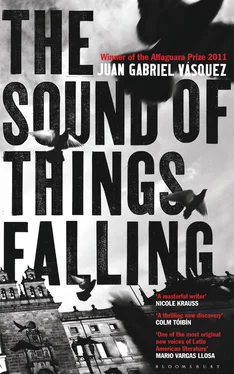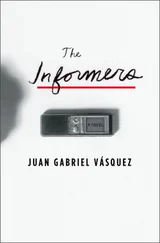I was about to ask what the article was about when my eyes fell on the surname Laverde, scattered across the page like a dog’s dirty paw prints.
‘Who is this Julio?’
‘My grandfather,’ said Maya. ‘Who at the time of those events wasn’t my grandfather yet. Nowhere near being my grandfather, he was fifteen years old.’
‘Nineteen thirty eight,’ I said.
‘Yes.’
‘Ricardo isn’t in this piece.’
‘No.’
‘He hadn’t been born yet.’
‘Not for a good few years,’ said Maya.
‘So then?’
‘So, that’s why I asked you: have you got time? Because if you’re in a hurry I’d understand. But if you really want to know who Ricardo Laverde was, start there.’
‘Who wrote it?’
‘That doesn’t matter. I don’t know. It doesn’t matter.’
‘What do you mean it doesn’t matter?’
‘The staff,’ said Maya impatiently. ‘Someone on the editorial staff wrote it, some journalist, a reporter, I don’t know. Some nameless guy who showed up at my grandparents’ house one day and started asking questions. And then sold the article and then wrote others. What does it matter, Antonio? What does it matter who wrote it?’
‘But I don’t understand,’ I said. ‘What is this?’
Maya sighed: it was a ridiculous sigh, like that of a bad actor, but in her it seemed genuine, just as genuine as her impatience. ‘This is the story of one day,’ she said. ‘My great-grandfather takes my grandfather to an exhibition of planes. Captain Laverde takes his son Julio to see planes. His son Julio is fifteen. Later he will grow up and get married and have a son he’ll name Ricardo. And Ricardo will grow up and then he’ll have me. I don’t know what’s so hard to understand. This is the first gift my father gave my mother, a long time before they were married. I read it now and I understand perfectly well.’
‘What?’
‘Why he gave this to her. To her it seemed a brazen gesture and even a little pretentious: look what they wrote about my family, my family’s in the press, and so on. But later she started to realize. She was a stray gringa who was going out with a Colombian without understanding very much about Colombia or that Colombian. When a person is new in a city, the first thing to find is a guide, right? Well, that’s what this 1968 magazine article about a day of thirty years earlier was. My father was offering my mother a guide. Yes, a guide, why not think of it like that. A guide to Ricardo Laverde. A guide to his emotions with all the routes well marked, and everything.’
I left a silence and she added, ‘Well, see for yourself. Shall I get you a beer?’
I said yes please, a beer, thanks. And I started to read. There was a short section title: A Holiday in Bogotá . And then the story began:
That Sunday of 1938 they were commemorating four hundred years since its founding, and the city was full of flags. The anniversary was not that exact day, but a little later; but the flags were already up all over the city, for the people of Bogotá back then liked to do things in good time. Many years later, remembering that ill-fated day, Julio Laverde would talk about the flags more than anything else. He remembered walking with his father from their family home to the Campo de Marte, in the neighbourhood of Santa Ana, which at that time was less a neighbourhood than an area of empty ground and was quite separate from the city. But with Captain Laverde there was not the slightest possibility of catching a bus or accepting a lift; walking was a noble and honourable activity and moving on wheels was something for the nouveau riche. According to Julio, Captain Laverde spent the entire walk talking about the flags, repeating that a true bogotano needed to know the significance of the city’s flag and constantly testing his son on civic history.
‘Don’t they teach you these things at school?’ he’d say. ‘It’s a disgrace. Where is this city headed in the hands of such citizens?’
And then he’d force him to recite that the red was a symbol of liberty, charity and health, and the yellow of justice, virtue and clemency. And Julio repeated uncomplainingly, ‘Justice, virtue and clemency. Liberty, charity and health.’
Captain Laverde was a decorated hero of the war against Peru. He’d flown with Gómez Niño and Herbert Boy, among other legends, and had been commended for his conduct in the Tarapacá operation and in the taking of Güepí. Gómez, Boy and Laverde, those were the three names that were always mentioned later when people talked about the Colombian Air Force’s role in the victory. The three musketeers of the air: one for all and all for one. Although they weren’t always the same musketeers. Sometimes it was Boy, Laverde and Andrés Díaz; or Laverde, Gil and Van Oertzen. It depended on who was telling the story. But Captain Laverde was always one of them.
Going to See a Hero
On that Sunday morning, at the Campo de Marte, there was to be a military fly-past to celebrate the anniversary of the founding of Bogotá. It was as lavish an event as a Roman emperor might have organized. Captain Laverde had arranged to meet three veterans there, friends he hadn’t seen since the armistice because none of them lived in Bogotá, but he had other reasons for attending the review as well. On the one hand, he’d been invited to the presidential grandstand by President López Pumarejo himself. Or almost: General Alfredo De León, who was very close to the president, had told him that the president would be very pleased to count on his illustrious presence.
‘Imagine,’ he’d said to him, ‘a figure like yourself who has defended our colours against the enemy aggressor, a man like you to whom we owe the liberty of our nation and the integrity of our borders.’
The honour of the presidential invitation was one of the other reasons. But there was an added reason, less honourable but more urgent. Among the pilots who were going to be flying was Captain Abadía.
César Abadía was not yet thirty, but Captain Laverde had already predicted that this young man from the provinces, skinny and smiling who had already clocked up fifteen hundred flying hours despite his youth, was going to become the best pilot of light aircraft in Colombian history. Laverde had seen him fly during the war with Peru, when the captain was not a captain but a lieutenant, a young man from Tunja who gave lessons in bravery and control to the most experienced German pilots. And Laverde admired him from a position of sympathy and experience: the sympathy of knowing that one is also admired and the experience of knowing that one has what the other lacks.
But what mattered to Laverde was not to see Captain Abadía’s reputed aerial feats himself. What he sought and desired was that his son should see them . That was why he was taking Julio to the Campo de Marte. That was why he had made him cross Bogotá on foot, through the flags. That was why he had explained they were going to see three types of plane, the Junkers, the Falcons of the observation squadron and the Hawks of the attack squadron. Captain Abadía would be flying a Hawk 812, one of the most agile and fastest machines ever invented by man for the tough and cruel tasks of warfare.
‘Hawk means halcón in English,’ the captain told young Julio, as he mussed the boy’s short hair. ‘You know what a hawk is, right?’
Julio said that he knew very well, and politely thanked his father for the explanation. But he spoke without enthusiasm. He was looking down at the ground as he walked, or maybe looking at the shoes of the people in the crowd, the fifty thousand people among whom they were now mingling. The coats brushing against him, wooden walking sticks and closed umbrellas banging into each other or getting tangled up, ponchos leaving a smell of wool in their wake, dress uniforms of soldiers, their chests covered in medals, police on duty strolling slowly among the crowd or observing from above, astride tall, ill-fed horses leaving a hazardous trail of stinking excrement in unpredictable places. . Julio had never seen so many people in one place together for the same purpose.
Читать дальше












